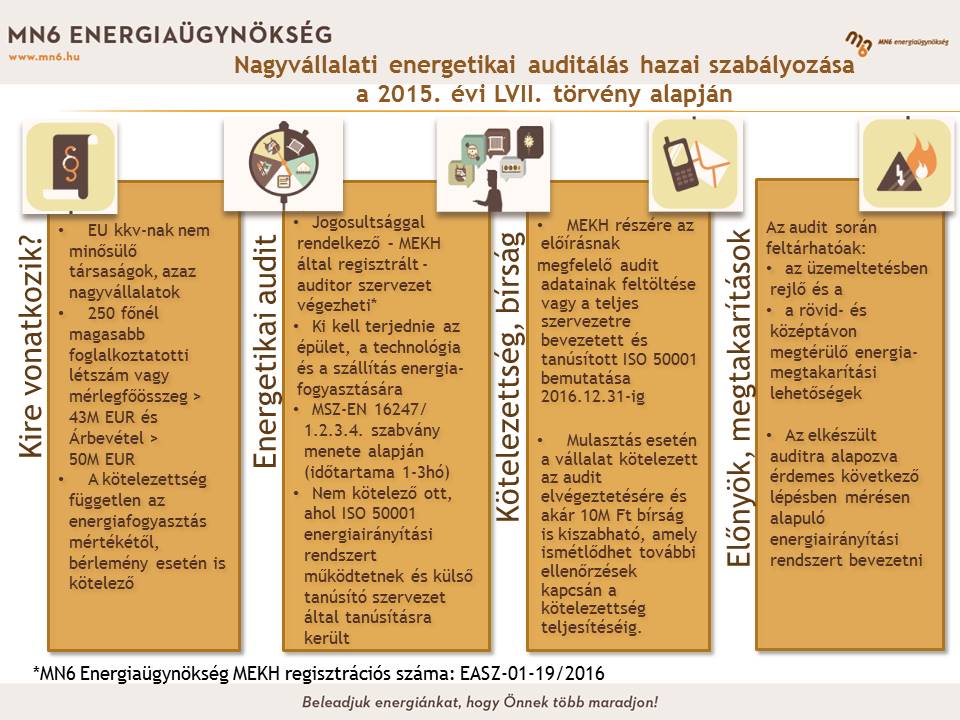![]() Nagyvállalatok
Nagyvállalatok
Az Energiahatékonyságról szóló 2012/27 EU irányelv 8. cikke alapján a kis- és középvállalkozásnak nem minősülő vállalkozásoknak négyévente energetikai auditálást kell végeztetnie energetikai jellemzőinek megismerése céljából.
Az energetikai auditnak a nagyvállalat, mint jogi személy egészére ki kell terjednie. Az audit tartalmi követelményei a direktíva VI. melléklete alapján kerültek meghatározásra: ki kell terjednie az épületek vagy épületcsoportok, ipari műveletek vagy létesítmények energiafogyasztási profiljának részletes felülvizsgálatára, beleértve a szállítást is.
Annak a kis- és középvállalkozásokról, fejlődésük támogatásáról szóló törvény szerinti kapcsolódó vagy partnervállalkozásnak, amelynek végsőenergia-fogyasztása nem éri el a nagyvállalat végsőenergia-fogyasztásának 5%-át, nem kell az energetikai auditálás lefolytatni vagy az energiagazdálkodási rendszert működtetni.
A következő lépésekkel nyújtunk segítséget ebben:
- Energetikai audit nagyvállalatoknak
- Energetikai szakreferens
- Számla és szerződés audit
- Energiabeszerzés
- ESCO finanszírozás
- Projektmenedzsment
- Épületenergetikai tanúsítás
- Energiairányítási rendszer – ISO 50001
[:en]
In order to meet the European Union’s environmental targets for 2020 and 2030 (the EU is aiming to reach 20% energy saving by 2020 and 27% or greater by 2030), the European Commission introduced Directive 2012/27/EC (Article 8.4) establishing EU-wide energy efficiency requirements, and as part of the action plan, large enterprises are required to carry out regular energy audits prepared by qualified independent experts in order to evaluate their energy consumption and savings potential. With slight variations in the exact wording of requirements, most Member countries stipulate that companies having 250 or more employees or an annual turnover exceeding 50 million euros and balance sheet total exceeding 43 million euros are obliged to carry out an energy audit.
The energy audit should cover all major energy consuming facilities, including energy consumed for transportation, heating and cooling, lighting, industrial or other machine operation, among other aspects. In addition to identifying, quantifying and reporting current energy consumption, an energy audit is also designed to provide reliable technical and economic information for formulating feasible and cost-effective recommendations for energy efficiency improvement measures and packages of measures that would lead to measurable energy savings if implemented. As such, the energy audit can potentially have significant benefits in addition to ensuring compliance with legislative requirements, i.e. it can constitute the source of energy savings business planning.
Our company is at your service to make your operations more efficient, and to enable you to provide transparent and competitive energy related services:
- Tax incentive for energy-efficiency investment projects
- Energy audit
- Independent Energy Consultant
- Auditing of bills and contracts
- Energy resourcing
- Consumption rationalization
- Investment planning
- Tendering advisory
- ESCO funding
- Project management
- Energy certification, and auditing
- Energy management system – ISO 50001
- Project communication
[:]

